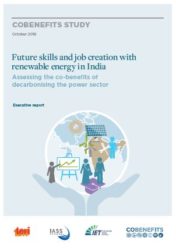 India has made significant progress in utilising its abundant renewable energy (RE) resources. The country has emerged as one of the leaders of the global energy transition, with a cumulative renewable energy installed capacity of 74 gigawatts (GW) at the end of 2018, and has ambitions to meet a target of 175 GW by the year 2022. This study analyses the employment effects of different plans for expanding power generation in India. The study aims to assess the co-benefits of a low-carbon energy transition in the country. Four different scenarios are analysed for future development of the power sector in India with varying shares of renewable energy. The study also provides an initial assessment of the skill requirements, attainment levels and technical training required for India’s present power sector plans and future low-carbon power sector ambitions.
India has made significant progress in utilising its abundant renewable energy (RE) resources. The country has emerged as one of the leaders of the global energy transition, with a cumulative renewable energy installed capacity of 74 gigawatts (GW) at the end of 2018, and has ambitions to meet a target of 175 GW by the year 2022. This study analyses the employment effects of different plans for expanding power generation in India. The study aims to assess the co-benefits of a low-carbon energy transition in the country. Four different scenarios are analysed for future development of the power sector in India with varying shares of renewable energy. The study also provides an initial assessment of the skill requirements, attainment levels and technical training required for India’s present power sector plans and future low-carbon power sector ambitions.
Download:
Key policy opportunities:
Policy opportunity 1: India can significantly boost employment through the power sector by increasing the share of renewables. With the government’s pledge under the NDC to scale up renewables in the country, net employment can be expected to increase by an additional 30 % by 2030. There is abundant room to achieve more; by following IRENA’s ambitious REmap pathway, employment through the power sector can be almost doubled.
Policy opportunity 2: By electrifying the rural areas in the country with distributed renewable energy technologies, such as small hydro, rooftop solar and biomass, the employment impact per installed capacity of these technologies is about 25 times greater than fossil-fuel based power generation.
Policy opportunity 3: Following the historical development in India’s coal sector, with a shift towards an ambitious decarbonised power sector in India, coal-sector-based employment is expected to decline by about 52 % between 2020 and 2050. This transition, however, needs to be efficiently managed politically to mitigate negative impacts on displaced workers and communities.
Year of publication: 2019
Editors: David Jacobs, Ayodeji Okunlola, Laura Nagel, Sebastian Helgenberger and Arunima
Hakhu – IASS/IET/TERI
Technical implementation: Neeraj Kuldeep, Poonam Nagar Koti, Arjun Dutt, Tanmay Bishnoi,
and Abhishek Dalal — Council on Energy, Environment and Water (CEEW), Skill Council for
Green Jobs (SCGJ), India
Suggested citation: IASS/TERI. Future skills and job creation with renewable energy in India. Assessing the co-benefits of decarbonising the power sector. Potsdam/New Delhi: IASS/TERI, 2019.
DOI: 10.2312/iass.2019.022
This study is part of a 2019 series of three studies assessing the co-benefits of decarbonising the power sector in India, edited by IASS, IET, TERI and UfU:
